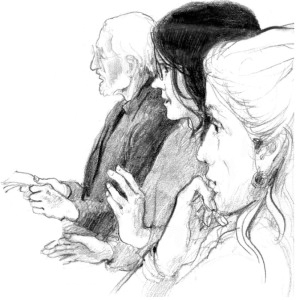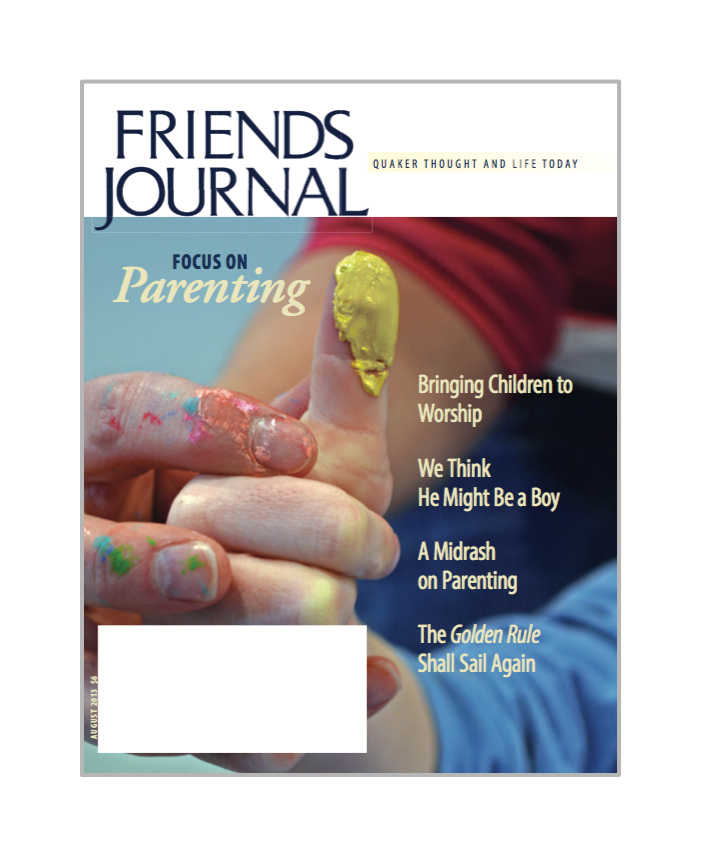
A few weeks ago in meeting for worship, a young couple I had never seen before sat down on my bench, the girl sitting next to me. During the silence, I sensed that she was restless. I had the strong feeling that she wanted to speak but was hesitating. I felt like leaning over to her and whispering, “If you feel like speaking, do.” But I didn’t! After meeting, during the time of socializing and refreshments, I introduced myself to her and said that I had felt that she wanted to speak. She said that she had, but she couldn’t find the right analogy. I wish that I had followed my leading and encouraged her to speak.
When I first started attending Quaker meetings as a graduate student in Ann Arbor, Michigan, I was impressed by the humility of spirit and the sincerity of the attendees as they spoke out of the silence. Over the years I have found that silent worship provides an opportunity to get in touch with the spirit within. I agree with William Penn who said in 1699, “True silence…is to the spirit what sleep is to the body, nourishment and refreshment.”
As a child I felt the joy and peace of being one with nature when I was alone in the orchard or in the sand hills beyond, exploring the wildflowers and bugs of my world. I had been taught that I was a spirit inhabiting a body, but only in the silence of nature did I feel “whole.” I have that same feeling of wholeness in silent worship in Quaker meeting.
I became a Friend many years ago, but I continued a busy life as a biology professor and world traveler. The study of the natural world was challenge enough! I took my abilities as a human being for granted (of course I could remember, reason, plan, and create, as well as be thoughtful, caring, and patient; also, I could get frustrated, disappointed, and angry). In recent years, I have become curious about the whole me and have begun a study of consciousness.
What a fascinating, complex being each of us is! Neurophysiological studies of the brain have revealed a great deal about its functions, but mind and consciousness are still mysteries. Bruce H. Lipton in The Biology of Belief said that our beliefs control our behavior! “The conscious mind is the seat of our personal identity, source of spirit—is the creative mind…. When it comes to sheer neurological processing abilities, the subconscious mind is more than a million times more powerful than the conscious mind.”
It is hard to accept that most of our responses come from that stored information and misinformation in the subconscious mind. I realize how wise George Fox and early Quakers were to trust the mystery of silent worship. One of my favorite writers, Rufus Jones, said in 1937, “the early Friends made the discovery that silence is one of the best preparations for communion with God and for the reception of inspiration and guidance.”
I reread The Journal of George Fox to learn how he used silence. Here are three examples: 1) “I passed to another town, where was another great meeting. . . I sat on a haystack, and spoke nothing for some hours.” 2) “Once a company of officers, being with me, desired me to pray with them. I sat still, with my mind retired to the Lord. At last I felt the power and Spirit of God move in me; and the Lord’s power did so shake and shatter them that they wondered, though they did not live in it.” 3) “When they were well gathered, I went into the meeting, and stood upon a chair about three hours. I stood a pretty while before I began to speak. After some time I felt the power of the Lord over the whole assembly and His everlasting life and Truth shone over all.” He summarized: “‘Yes,’ said I, ‘we meet to wait upon the Lord.’”
George Fox discovered how to be lead by the Spirit. During silent worship, the Spirit—the Light within—illuminates the concerns of sincere seekers and resolutions may be discerned. Or, when more time is needed to deal with a concern, the seekers may have the patience “to let it season.”
Robert Griswold in “The Role of the Personal Ego in Meeting and Its Effect on Spiritual Communion” warns that “we can’t find out who we are until we let go of who we think we are.” He explains that “we need the Light within because there is darkness within where the Light needs to shine.”
Many forms of meditation have been developed around the world. The Quaker silent worship is a simple form. Each person needs to find his or her own way to allow the Spirit to communicate with the conscious mind. Some may hear a “still, small voice,” others may have leadings. I need to follow the leadings of my spirit
Ruth Lofgren is a member of Friends Meeting of San Antonio (Tex.). She joined Brooklyn (N.Y.) Friends Meeting in 1968.



Comments on Friendsjournal.org may be used in the Forum of the print magazine and may be edited for length and clarity.